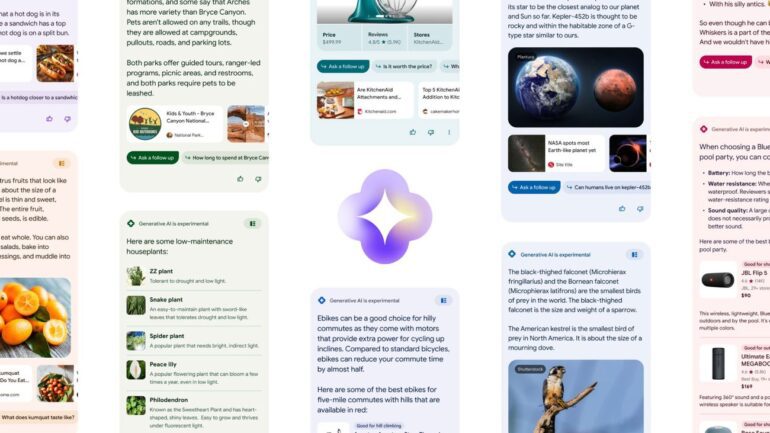TL;DR:
- Google’s new Search Generative Experience (SGE) powered by AI is causing concern among publishers.
- SGE generates summaries for search queries and affects publishers’ web traffic.
- Publishers must decide whether to allow their content for SGE summaries or risk exclusion from regular Google search.
- Google is considering compensation for content used by AI but hasn’t provided a concrete solution.
- The introduction of Google-Extended allows publishers to opt-out from AI content use.
- Publishers are concerned about maintaining visibility and monetization in the evolving digital landscape.
Main AI News:
The world of publishing is buzzing with apprehension, and at the center of it all is Google’s latest innovation in artificial intelligence. Since May, Google has introduced a groundbreaking search experience, known as Search Generative Experience (SGE), powered by state-of-the-art generative AI technology. This transformative product has been rolled out in the United States, India, and Japan, and it’s making waves in the publishing industry.
SGE utilizes the power of AI to craft succinct summaries for select search queries. These informative summaries make their presence felt at the pinnacle of Google’s search homepage, offering users convenient links to delve deeper into their queries. But what has publishers on edge is the potential use of their content by Google’s AI to create these summaries.
To safeguard their content from being harnessed by Google’s AI for summary generation, publishers find themselves facing a challenging decision. They must employ the very tool that would also exclude them from regular Google search results, effectively making it harder for users to locate publishers who opt out of participating in SGE.
Google asserts that the AI-generated summaries are amalgamations of information culled from various web sources, and the accompanying links serve as stepping stones for further exploration. The company views SGE as an opt-in experiment that involves users in refining and enhancing the product.
However, publishers see this new search tool as the latest wrinkle in their intricate relationship with Google. They find themselves in a dual role, simultaneously competing with Google for online advertising and relying on the tech giant for a substantial portion of their web traffic.
Recently, four major publishers spoke to Reuters, requesting anonymity due to ongoing negotiations with Google. They’re grappling with a multitude of concerns, ranging from web traffic and attribution for the content featured in SGE summaries to the accuracy of these summaries. Above all, publishers are keen on receiving compensation for the content that becomes the foundation for Google and other AI companies to train their AI algorithms.
In response, a Google spokesperson issued a statement, saying, “As we integrate generative AI into Search, our priority remains directing valuable traffic to a diverse group of content creators, including news publishers, to support a thriving and open web.“
Regarding compensation, Google has expressed its commitment to gaining a deeper understanding of the generative AI landscape and actively seeking input from publishers and stakeholders.
In a move that aims to address some of these concerns, Google unveiled a new tool in late September known as Google-Extended. This tool empowers publishers to decide whether their content should be utilized for Google’s AI training purposes.
Danielle Coffey, President and CEO of the News Media Alliance, an industry trade group, lauds this as a “good faith gesture.” However, the question of whether monetary compensation will follow remains unanswered. The industry is eagerly watching to see to what extent Google embraces a more equitable value exchange.
It’s worth noting that the new tool doesn’t allow publishers to block their content from being used in SGE summaries without also vanishing from traditional Google search results. Publishers depend on visibility in Google search to secure advertisers, and the layout of SGE has pushed traditional search links further down the page. This shift could potentially result in a 40% reduction in traffic to these links, warns an official from one of the publishing companies.
The more concerning prospect is that users might bypass the traditional search links altogether if the SGE summaries satisfy their information needs. Nikhil Lai, an expert from Forrester Research, notes that SGE is likely to “significantly reduce publishers’ web traffic” and urges publishers to rethink how they gauge the value of their content, possibly shifting focus from click-through rates.
Conclusion:
The introduction of Google’s AI-driven Search Generative Experience (SGE) has created a complex dynamic for publishers, who must weigh the benefits of participation against potential losses in web traffic. While Google has made some efforts to address publisher concerns through tools like Google-Extended, the market remains uncertain about the long-term implications of AI-driven search on content visibility and monetization. Publishers must adapt their strategies to maintain a strong presence in this evolving landscape.

